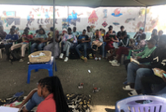Hapo zamani za kale, palikuwa na binti mrembo, mkarimu, mwenye akili aliyeitwa Poshia. Wanaume wengi walitaka kumuoa na walikuja ili kuomba uchumba. Baba Poshia alikuwa amefariki dunia. Alikuwa tajiri na aliacha wosia ulioelekeza kamba yeyote aliyetaka kumuoa Poshia, lazima achague kati ya masanduku tatu: sanduku la dhahabu, sanduku la fedha na sanduku la risasi. Atakayechagua sahihi ndiye atakayeruhusiwa kumuoa Poshiia na kurithi mali zote za Baba Poshia. Siku moja, Mfalme wa Moroko alikuja ili kuomba uchumba.
POSHIA: Kayavute mapazia masanduku yaonekane kwake mtukufu huyu mtoto wa mfalme. Haya sasa kachague.
MOROKO: La kwanza, ni la dhahabu, lenye maandiko haya:
‘Anichaguaye mimi atakuwa amepata kile wanaume wengi wakitamanicho sana.’
Na la pili, ni la fedha, linaloahidi hivi:
‘Anichaguaye mimi apate astahilicho.’
La, tatu, risasi butu, na onyo lake ni butu:
‘Anichaguaye mimi itambidi atoe, na pia ahatarishe chochote alicho nacho.’
Nitajuaje yakuwa nimechagua vizuri?
POSHIA: Moja lina picha yangu, mzawa wa mfalme: Ukilichagua hilo basi na mimi ni wako.
MOROKO: Muungu Fulani uniongoze. Hebu nione; nitayachagua tena maandiko toka mwisho. Nitaanzia la tatu: lasemaje, la risasi?
‘Anichaguaye mimi itambidid atoe na pia ahatarishe cho chote alicho nacho.’
Itambidi atoe - atoleeni? Risasi? Na pia ahatarishe - kwa ajili ya risasi? Sanduku hili latisha: wahatarishao vyote hutumaini kupata faida iliyo nzuri: Wenye moyo wa dhahabu hawajali takataka; Kwa hiyo basi sitoi na wala sihatarishi chochote nilicho nacho kwa sababu ya risasi. La fedha lasema nini, lenye rangi ya baridi?
‘Anichaguaye mimi apate astahilicho’.
Apate astahilicho! Subiri hapa, Moroko. Upime thamani yako kwa mkono wa mwadilifu: Kama ukithaminiwa vile ujifanidivyo wastahili kutosha; walakini ya kutosha inaweza isitoshe kumpata siti huyu. Bali nikitia shaka kuwa simstahili,Basi hapo nitakuwa najiumbua mwenyewe. Stahili yangu ni nini? Bila shaka ni bibie. Namstahili, hakika, kwa nasaba na kwa mali, kwa madaha na kwa sifa zote za malezi mema na kuzidi yote hayo namstahili kwa pendo. Vipi, nisiendelee, nichague papa hapa?
Hebu tuyaone tena ya sanduku la dhahabu:
‘Anichaguaye mimi atakuwa amepata kile wanaume wengi wakitamanicho sana!’
Naam, ni siti huyu; anotamaniwa kote. Toka pande zote nne za dunia wanakuja kubusu sanamu hii takatifu ilo hai: Majangwa ya Hirikani na nyika pana ajabu, za Uarabuni kote, sasa zimekuwa njia ziletazo watawala kumwona Poshia bora. Nayo dola ya bahari ambayo inapofura hutemea hata mbingu, haiwezi kuzuia nia ya wageni hao; ila wanazidi kuja, kama wavuka kijito, kumwona Poshia bora. Moja la matatu haya lina picha yake nzuri. Itawezekana kweli liwe lile la risasi? Wazo chafu kama hilo lingekuwa ni laana. Halifai japo kuwa sanda yake ya kaburini.
Au niwaze ya kuwa kawekwa ndani ya fedha? Moja ya kumi na moja ya thamani ya dhahabu? Hilo ni wazo la dhambi! Kito cha thamani hivi hakiwekeki po pote ila ndani ya dhahabu. Uingereza wanayo sarafu tu ya dhahabu, ambayo kwa juu yake imechapwa malaika. Bali hapa malaika mwenyewe hasa yu ndani ya sanduku hili hapa, na bahati nijaliwe!
POSHIA: Ni huu hapa, chukua, mzawa wa mfalme; kama sura yangu imo nimekuwa mali yako.
[Anafungua sanduku la dhahabu]
MOROKO: Mama yang! Nini hii? Ni fuu tupu la kichwa, ambalo katika jicho lina hati ma’ndiko. Nitasoma maandiko.
Kila kitu king’aacho usidhani ni dhahabu,
umekisikia hicho ni kiambo cha mababu.
Kuniona kwa nje tu, wengi wameuza utu;
Makaburi ya dhahabu yana mafunza ajabu.
Ungekuwa na werevu ulivyo na ushupavu,
kijana kiwiliwili na mzee kwa akili,
usingelistahili kulipewa jibu hili:
Basi buriani dawa; pposa umefarikiwa.
Nimefarikiwa kweli. Bure nimejitanibu. Basi buriani, joto; nawe, makiwa, karibu. Basi kwa heri Poshia. Ninayo
huzuni sana siwezi kwa heri ndefu: Ndivyo wanavyoagana watu waliopoteza.
[Aondoka na Wafuasi wake. Tarumbeta]























